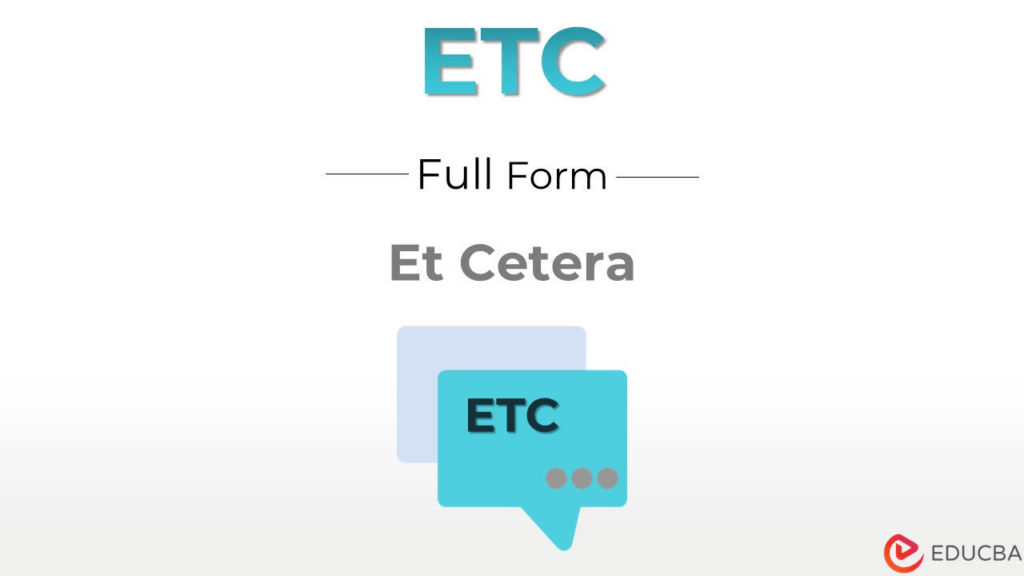Full Form of ETC (Et cetera)
Et cetera is the full form of the acronym ETC, one of the most common words in every type of content, but not many people think about it.
There is a significant enigma about:
- Where did this word come from?
- What does it signify?
- What is its importance?
- How to use it differently?
This blog will teach us everything about this 3-letter word – etc. – et cetera.
Origin, Meaning, & More
Etc – et cetera is a Latin word with several abbreviations, including &c, etc., et cet., etc., and &c. If we talk about English, this Latin abbreviation means “and other related things” or “so forth.” The literal translation from Latin to English is where the meaning of “et” is “and,” and “cetera” is “the rest.”
When we write English sentences, this abbreviation is common. The frequency of use in business and technical writing is higher than in informal writing, where the frequency is low. Some of the proper substitutes of etc. – et cetera, are so on & so forth.
What Does it Indicate?
Etc – Et Cetera indicates that while mentioning a few items on the list, you still have left some behind.
How to Use Etc – Et Cetera?
If we talk about how to use this word, here is a simple explanation:
Whenever you use “etc.” at the end of the list, there is a comma in the middle of a sentence that follows the word. But if you have used it at the end of a sentence, there is no need for a comma.
Let’s discuss this catchy word in detail:
Several catchphrases in the history of writing have mentioned “et cetera” to end something on an ambiguous note.
There is a classic musical called “The King and I?”
In this musical, there is a scene in which King Mongkut informs the governess about all the rules of conduct to be followed. He also explained that his head would always be higher than hers, and she will copy his actions. “kneel when the king kneels and sit where he sits.” At the end of this explanation, the King famously says, “et cetera, et cetera.” It indicated his clarification that several similar actions were included in that list.
How Can we Use Etc in the Sentence?
There is always a right and a wrong way to write “Etc – et cetera” in your sentences. Especially in formal writing, like a research paper, be careful about how you use the word. This abbreviation must only be used when conveying that some items haven’t been mentioned. But these items should always be a part of the same group.
Let’s understand through examples:
Sentence 1:
- Let’s read children’s books – Cinderella, Snow White, Three Musketeers, etc.
- Let’s read children’s books – Cinderella, Snow White, How to Make Money, etc.
We cannot use “etc.” in the second sentence because the list should only include books for children. “How to Make Money” is a book that does not fit into the category.
Sentence 2:
- We must buy groceries – vegetables, spices, detergent, etc.
- We have to buy groceries – vegetables, spices, clothes, etc.
The second sentence is wrong because clothes do not belong to a particular class.
Another way to test if you can use “etc. – et cetera” in a specific sentence is by saying “so on” out loud. Does it make sense? If yes, then you can use the abbreviation.
Remember:
You cannot use “etc.” because it leads to redundancy in the sentence.
Examples of Etc – Et Cetera in the Sentences
- I have a few chores at home – dusting, moping, cooking, etc.
- Did you know that clothes, makeup, jewelry, etc., are all on sale?
- Who are the first respondents? Are they state residents, voters, etc.?
In the above examples, the 1st and 3rd sentences end with, etc. – et cetera, so there is no requirement for a comma.
But if you look at the 2nd sentence, the abbreviation falls in the middle. It is essential to use a comma to frame the sentence correctly.
Pronunciation of the word Et Cetera
The pronunciation of the full form is “ek ˈsetərə,” and a few dictionaries have adopted the term and turned it, official. Since the word is Latin and is now profusely used in foreign phrases, it is often difficult for the speakers to pronounce it correctly. “Et” has a “T” sound at the end, but for a lot of Americans, it has been taken over by the sound of “K.” This kind of mistake in mispronunciation is known as assimilation. The word is often used when the reader is tired of the long list ahead of him. It is just a way to cut short the sentence.

